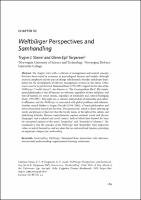Chapter 10 Weltbürger Perspectives and Samhandling
Author(s)
Steiro, Trygve J.
Torgersen , Glenn-Egil
Language
EnglishAbstract
"The chapter starts with a criticism of management and control concepts
that have been rooted in economic or psychological theories and models, although
society’s complexity and the pace of change will demand a broader and deeper foundation
for the development of effective management systems in the future. Other
voices need to be put forward. Immanuel Kant (1795/1991) argued for his idea of the
Weltbürger (“world citizen”), also known as “The Cosmopolitan Ideal”. His fundamental
philosophy is that all humans are welcome, regardless of time and place, and
that all humans are world citizens, regardless of nationality and cultural belonging
(Kant, 1795/1991). All people are co-citizens, independent of nationality and cultural
affiliation, and the Weltbürger is concerned with global problems and solutions.
Another central thinker is Jacques Derrida (1930–2004), a French philosopher and
writer particularly known for the term “Deconstruction”, which is about splitting up
words and phrases to find out what they really mean, in the light of the culture and
underlying attitudes. Human comprehension requires common words and phrases
(language), and a cultural and social context, both of which have formed the basis
for conceptual analysis of the terms “hospitality” and “threshold of tolerance”. The
conclusion is that the concepts of the Weltbürger and “hospitality” have important
values in and of themselves, and are ideas that are universal and timeless, providing
an important compass for samhandling."
Keywords
Samhandling; Weltbürger; Immanuel Kant; interaction; risk; tolerance; international understanding; organizational learning; unforeseenDOI
10.23865/noasp.36.ch10OCN
1076716278Publisher website
https://www.cappelendamm.no/Publication date and place
Oslo, 2018Classification
Society and Social Sciences
Warfare and defence
Military and defence strategy


 Download
Download